Special Report
Companies With the Best and Worst Reputations
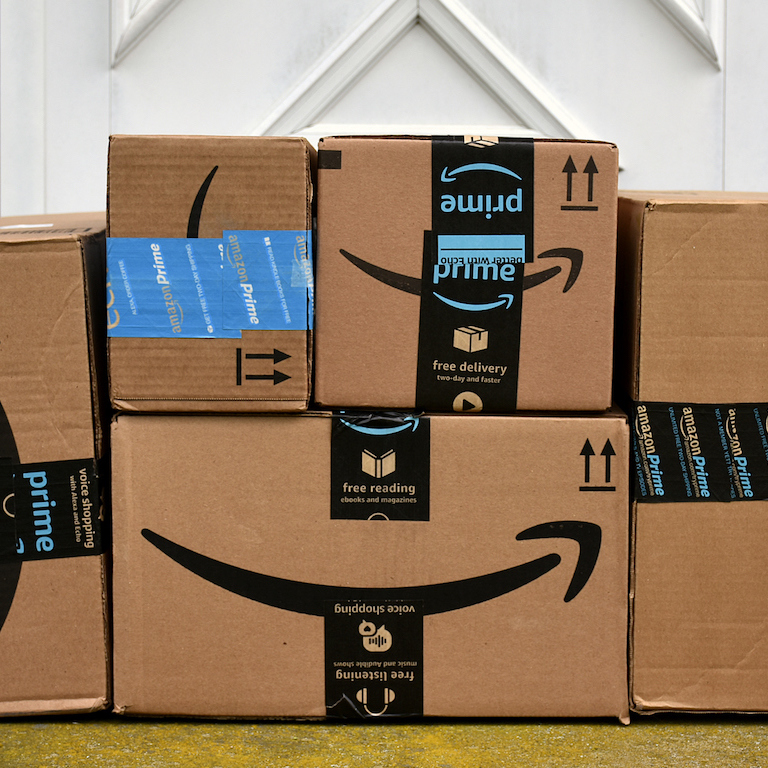
Published:
Last Updated:

Corporations benefit tremendously when they have the trust and confidence of their employees, customers, and shareholders. Similarly, a scandal or perceptions of impropriety can spell doom for a business — or at the very least, tarnish a company’s reputation for years and even decades. In short, companies can live or die by their reputation.
The importance of public perception in the corporate world is underscored by America’s more than $13 billion public relations industry. Still, corporate PR spending is only the tip of the iceberg. A strong reputation can take years, or even decades to build, and everything a company does in the public eye, intentionally or not — including its core business — influences public opinion.
For the 19th consecutive year, the Harris Poll Reputation Quotient ranked the world’s most visible companies by reputation. The poll asked respondents to rate each company based on six measures: social responsibility, products and service, emotional appeal, leadership, financial performance, and workplace environment.
The highest ranking companies this year share similar characteristics, including commitment to their values, strong community relations, and furthering worthy social causes. Meanwhile, the companies with the worst reputations typically have either been embroiled in scandal, or are perceived as hindering social progress or as having a toxic work environment.
24/7 Wall St. reviewed the 2018 Harris Poll Reputation Quotient to identify the companies with the best and worst reputations. Most companies are not strangers to their respective side of the list. Still, a handful rank among the most reputable or least reputable for the first time.
Click here to see the companies with the best reputations.
Click here to see the companies with the worst reputations.
Click here to see our detailed findings and methodology.
Companies With the Best Reputations
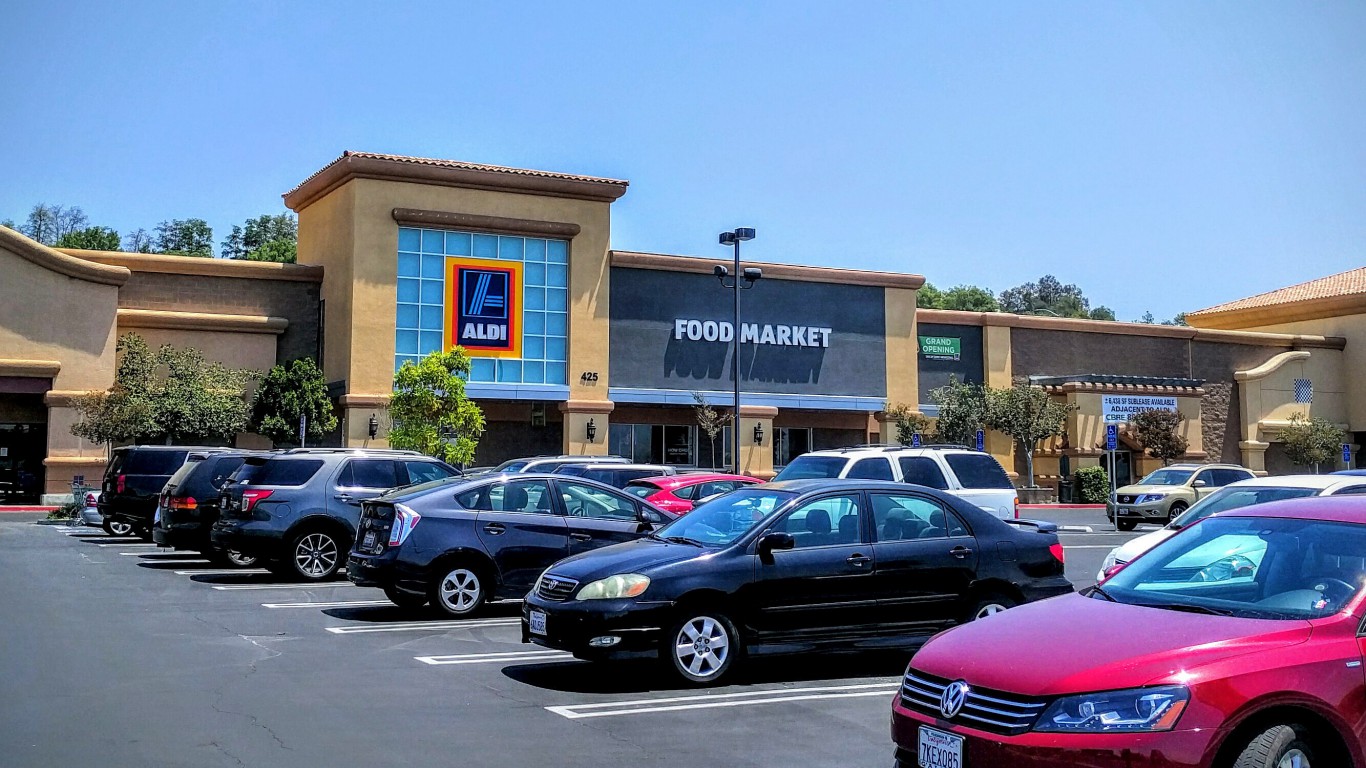
10. Aldi
> 2018 reputation quotient: 80.43
> 2017 reputation quotient: 76.96
> Industry: Grocery stores
> CEO: Jason Hart
Based on six measures of corporate reputation — products and services, vision and leadership, emotional appeal, workplace environment, financial performance, and social responsibility — grocery store chain Aldi ranks among the top 10 companies in the world. The company ranks especially well the emotional appeal and social responsibility — and for good reason. For the fourth year in a row, Greenpeace has recognized Aldi for its practices related to seafood sustainability.
The grocery store chain, headquartered in Batavia, Illinois, is expanding rapidly. The company anticipates a total of 2,500 total U.S. locations by the end of 2022, up from the current store count of 1,600. Aldi is one of four grocery store chains to rank among the companies with the best reputations.
[in-text-ad]
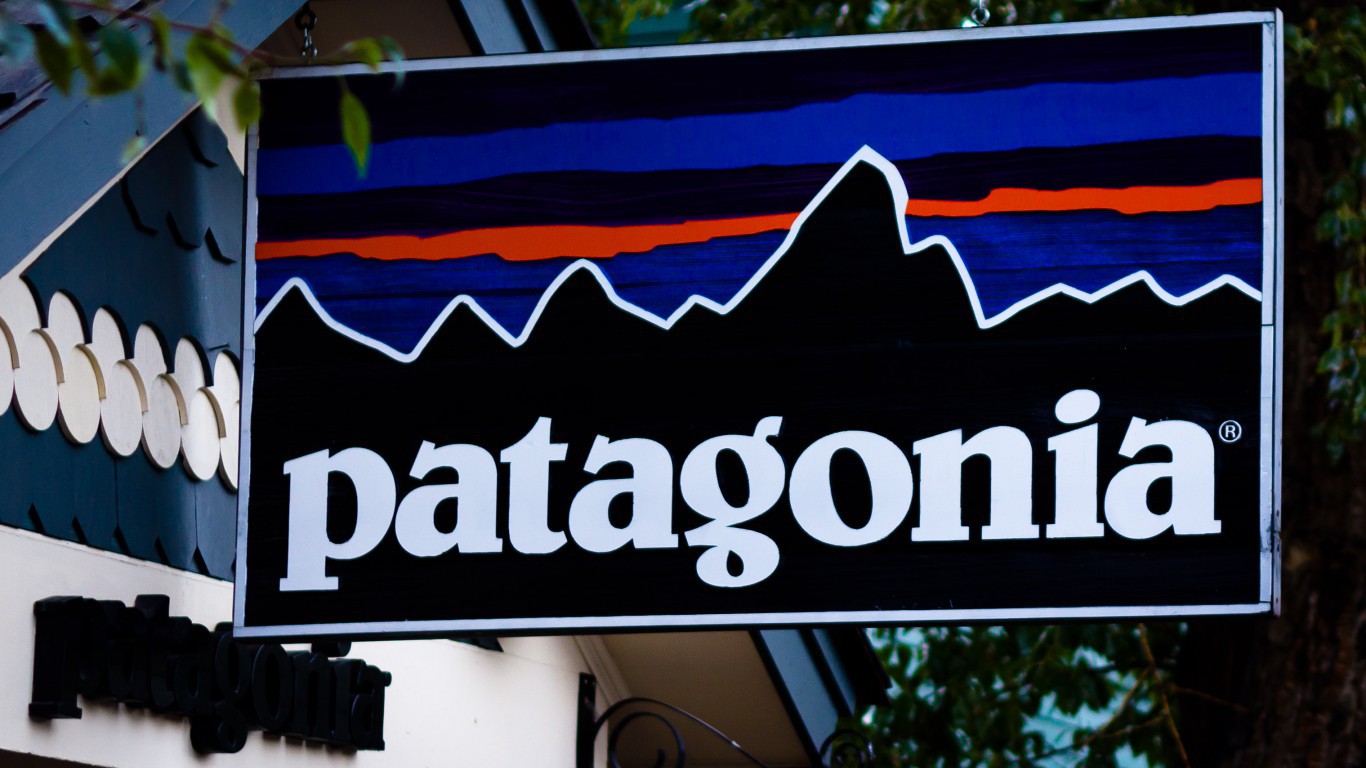
9. Patagonia
> 2018 reputation quotient: 80.44
> 2017 reputation quotient: N/A
> Industry: Clothing
> CEO: Rose Marcario
Clothing company Patagonia’s reputation is bolstered largely by the quality of its products and perceptions of the company’s social responsibility. The company guarantees the quality of all of its products and offers refunds, replacements, or repairs for customers who are not satisfied. The company also appears to be dedicated to protecting the environment, using recycled polyester in many of its garments and donating a portion of revenue to fund grassroots environmental groups nationwide. On Black Friday in 2016, Patagonia had a widely publicized sale, donating 100% of its revenue on one of the biggest shopping days of the year to environmental protection groups. That day, Patagonia reported $10 million in sales, five-times what was expected.
Patagonia ranks among the companies with the best reputations for the first time this year.
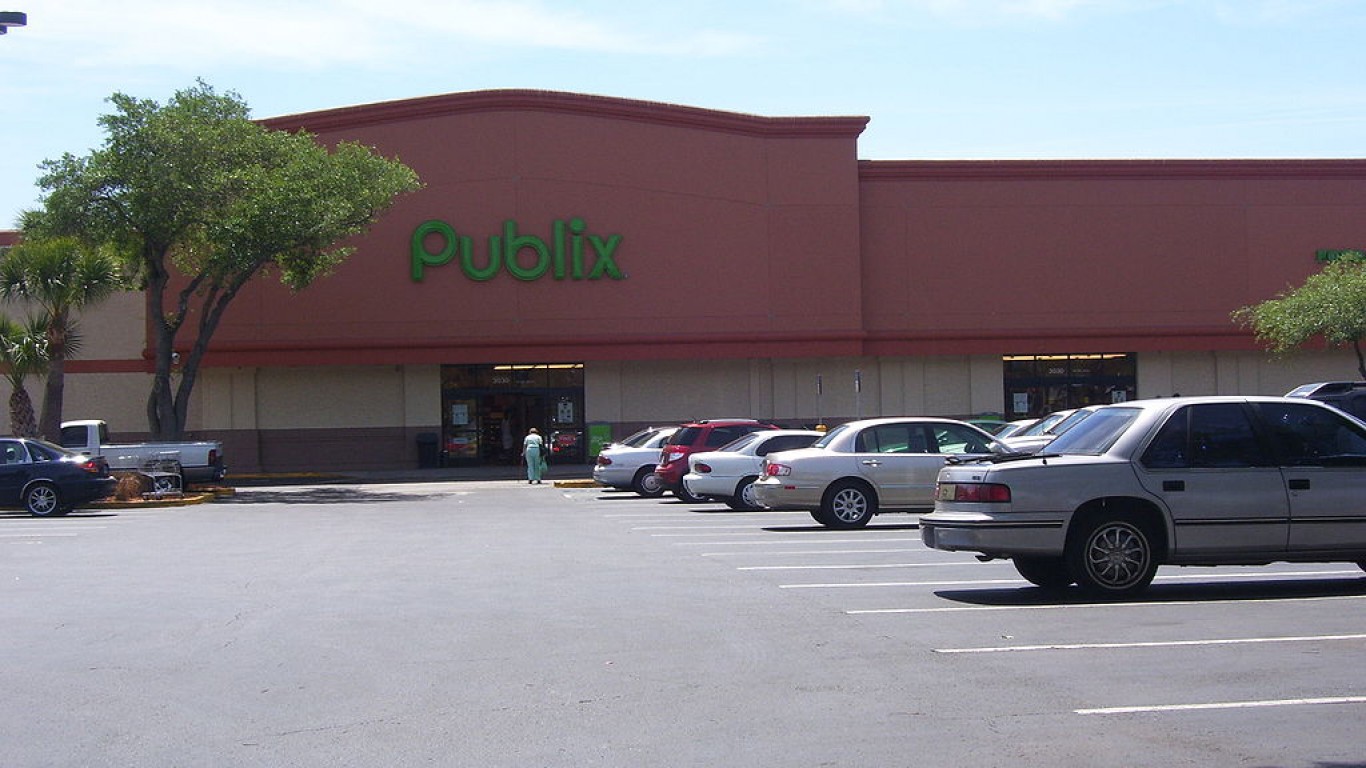
8. Publix Super Markets
> 2018 reputation quotient: 80.81
> 2017 reputation quotient: 82.78
> Industry: Grocery stores
> CEO: Todd Jones
With nearly 1,200 locations in seven states and nearly $35 billion in annual revenue, grocery store chain Publix is the largest employee-owned company in the country. It also has one of the best corporate reputations among the general public. Social responsibility can have a major impact on public relations, and Publix donated some $67 million to United Way and Feeding America in 2017 alone.
Publix is also popular among its employees. Based on reviews posted on Glassdoor, Publix employees regularly tout the company’s benefits, which include cash bonuses and a 401(k) matching program. Some 72% of Publix employees would recommend a job with the company to a friend.
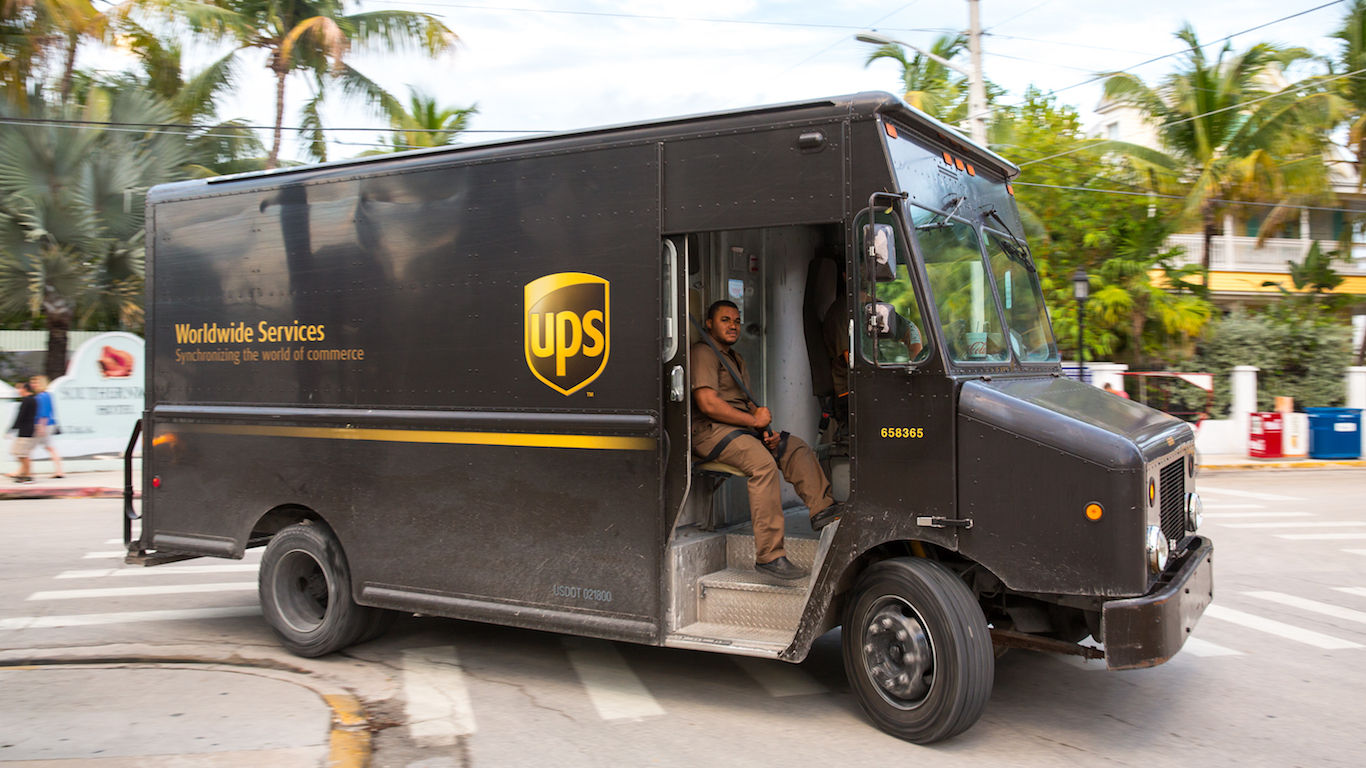
7. UPS
> 2018 reputation quotient: 81.12
> 2017 reputation quotient: 82.05
> Industry: Shipping and logistics
> CEO: David Abney
United Parcel Service, or UPS, is the world’s largest package delivery company, employing more than 454,000 people. Ranking especially high in emotional appeal, UPS is one of the most trusted companies in the world. Each day, the company delivers about 20 million packages and documents worldwide. UPS’s ranking among the most reputable companies is also due in large part to strong financial performance. The company’s revenue climbed from $58.4 billion in 2015 to $65.9 billion in 2017, increasing each year. UPS has also either met or beat Wall Street’s earnings expectations in each of the last four quarters.
Like most companies on this list, UPS is involved in multiple charity initiatives, including environmental protection and global humanitarian relief.
[in-text-ad-2]
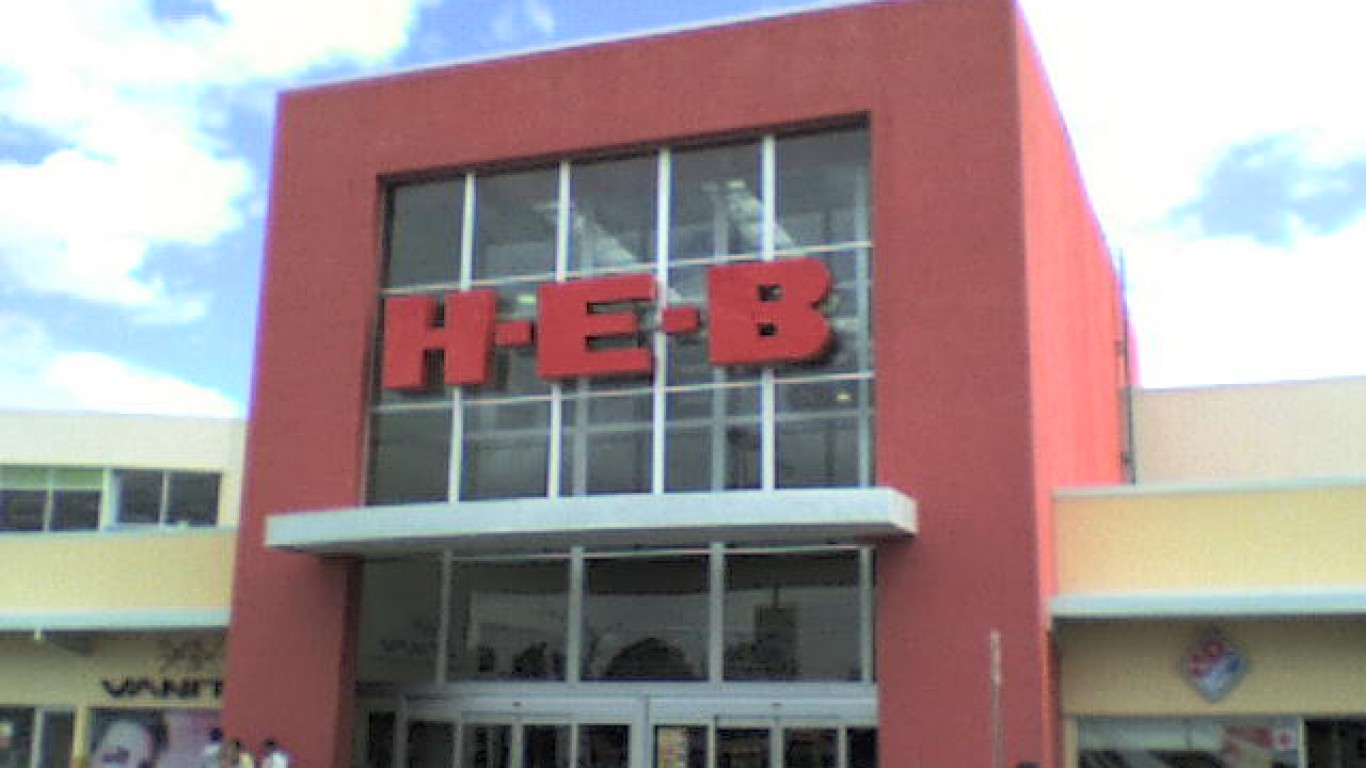
6. HEB Grocery
> 2018 reputation quotient: 81.14
> 2017 reputation quotient: N/A
> Industry: Grocery stores
> CEO: Charles Butt
HEB is one of four grocery store chains to rank among the world’s most reputable companies. According to Harris Poll, grocery stores appeal to the American public because of their close connection to the community and the natural comfort they provide as purveyors of food. The company, which began as a single, small grocery store in Texas in 1905, is now a multi-billion dollar chain with 340 locations.
HEB Grocery is held in high regard among its employees. Based on reviews posted on Glassdoor, some 85% of HEB employees would recommend a job with the company to a friend. Positive reviews cite good pay and benefits as well as flexible hours. The company’s CEO, Charles Butt, also gets high marks from his employees with a 97% Glassdoor approval rating. The is the first year HEB has ranked among the companies with the best reputations.
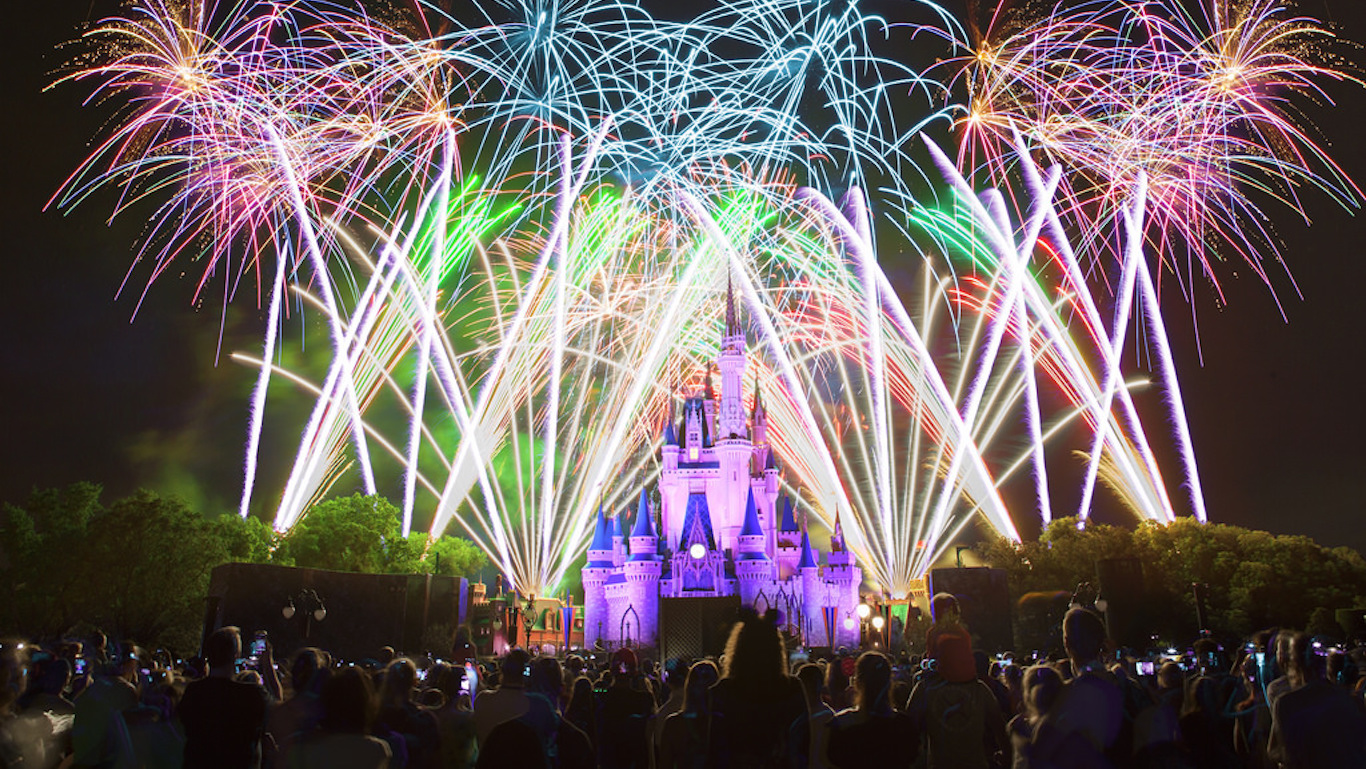
5. The Walt Disney Company
> 2018 reputation quotient: 81.53
> 2017 reputation quotient: 82.04
> Industry: Diversified media
> CEO: Robert Iger
Walt Disney is one of the most iconic and reputable companies in the world. The company is behind some of the most popular and successful animated films ever made, including “Toy Story,” “The Lion King,” and “Aladdin” — as well as the most popular amusement park in the world. Philanthropy has also helped Disney increase its reputation. The company donated over $348 million in 2017 to nonprofits that help children, families, and communities in need.
Disney has also done well by investors. Though the company’s share price is down slightly year-to-date, in the last five years, the value of Disney stock climbed from less than $62 to over $100, roughly a 65% increase.
[in-text-ad]
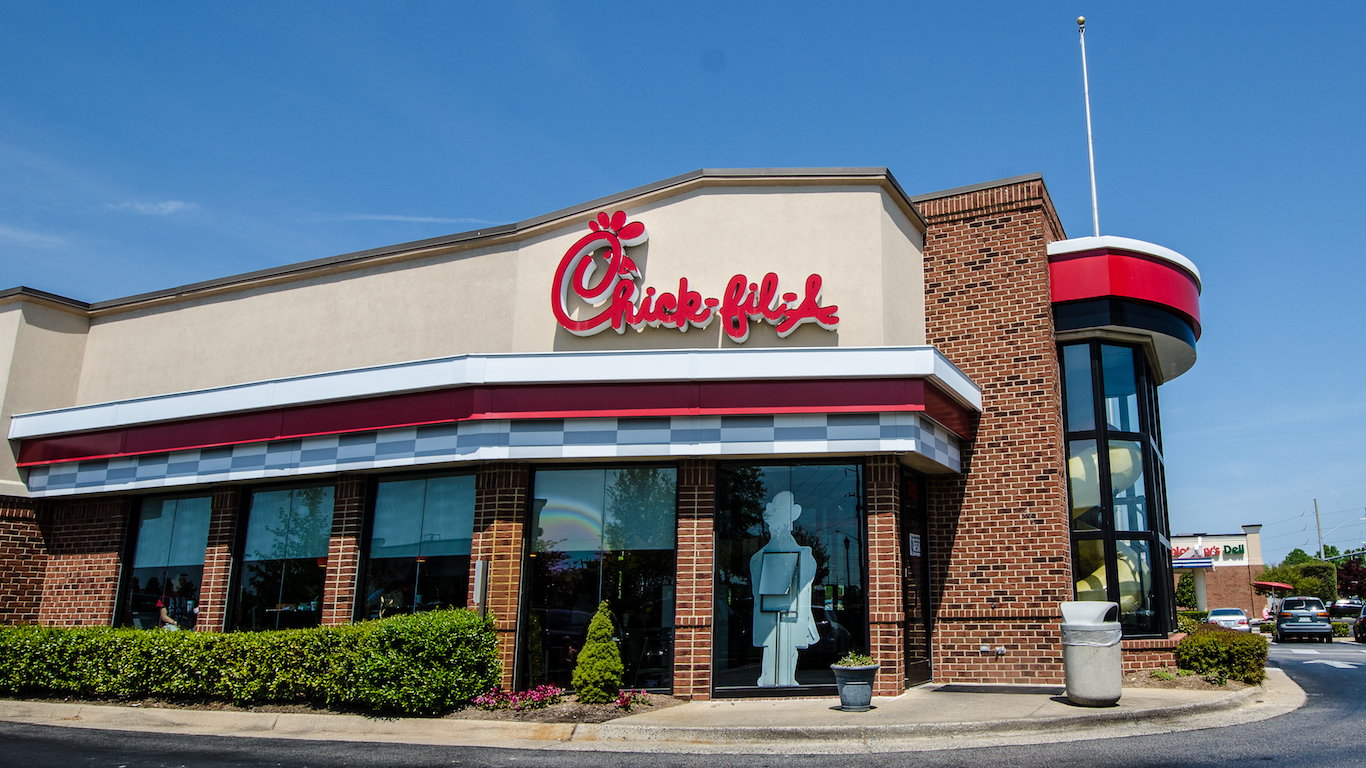
4. Chick-fil-A
> 2018 reputation quotient: 81.68
> 2017 reputation quotient: 78.52
> Industry: Fast food
> CEO: Dan Cathy
Chick-fil-A, a fast food chain that specializes in chicken sandwiches, is the only restaurant among the 10 most reputable companies. As is the case with most companies on this list, Chick-fil-A is an active corporate philanthropist. The company regularly donates surplus food to local shelters and soup kitchens in addition to making disaster relief donations. The company has also awarded tens of millions in college scholarships for its employees over the last several decades. Along with Wegmans, Chick-fil-A is one of several companies on this list that are family owned.
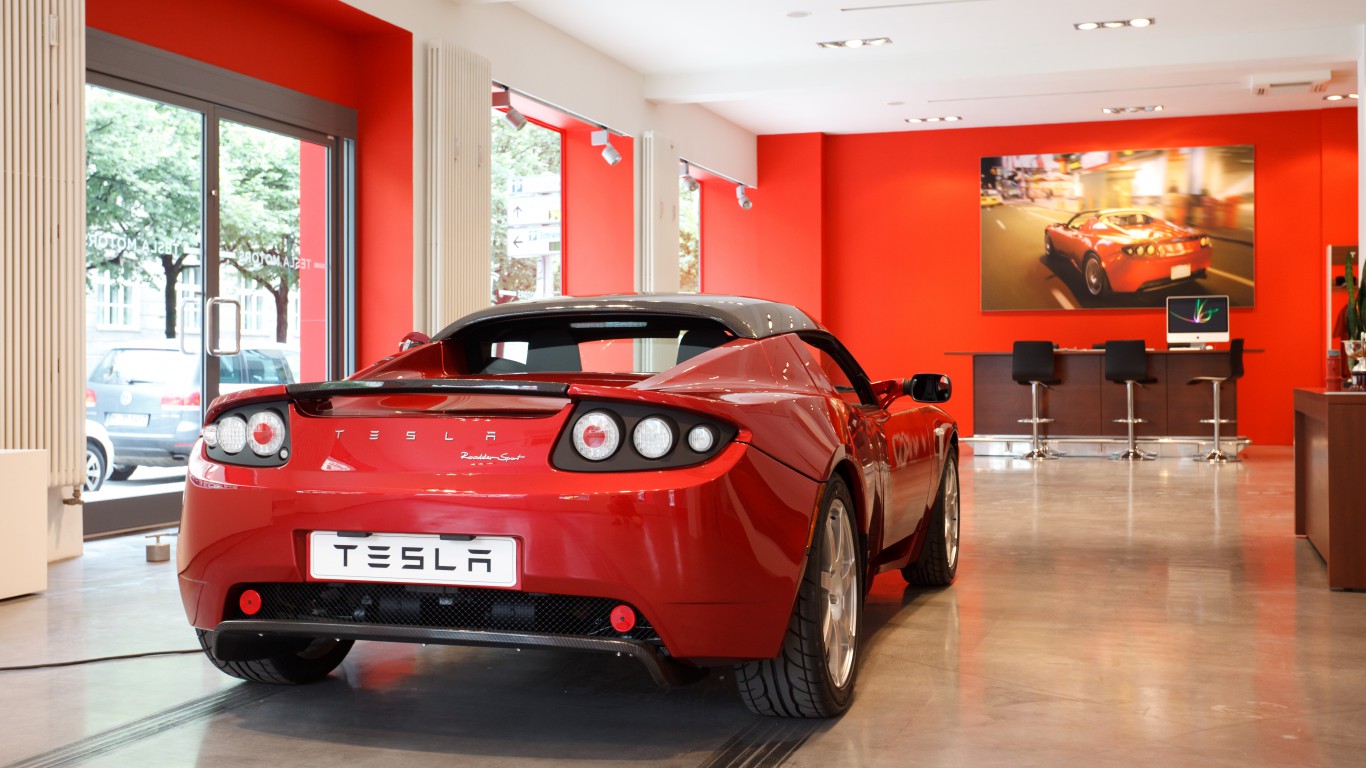
3. Tesla Motors
> 2018 reputation quotient: 81.96
> 2017 reputation quotient: 81.70
> Industry: Automotive
> CEO: Elon Musk
Headed and founded by billionaire visionary Elon Musk, Tesla ranks higher in vision and leadership than any other company. Musk is heavily involved in all levels of operations. Tesla’s business and mission is to mass produce affordable electric vehicles as well as batteries and solar roofs. Partially because it is perhaps the world’s largest scale private sector initiative to reduce carbon emissions and slow climate change, Tesla also outranks every other company in social responsibility. Growing rapidly, the company’s revenue more than doubled from $4.0 billion in 2015 to $11.8 billion in 2017.
Tesla’s reputation has recently taken a hit, however, as production challenges of the company’s new Model 3 have had investors worrying.
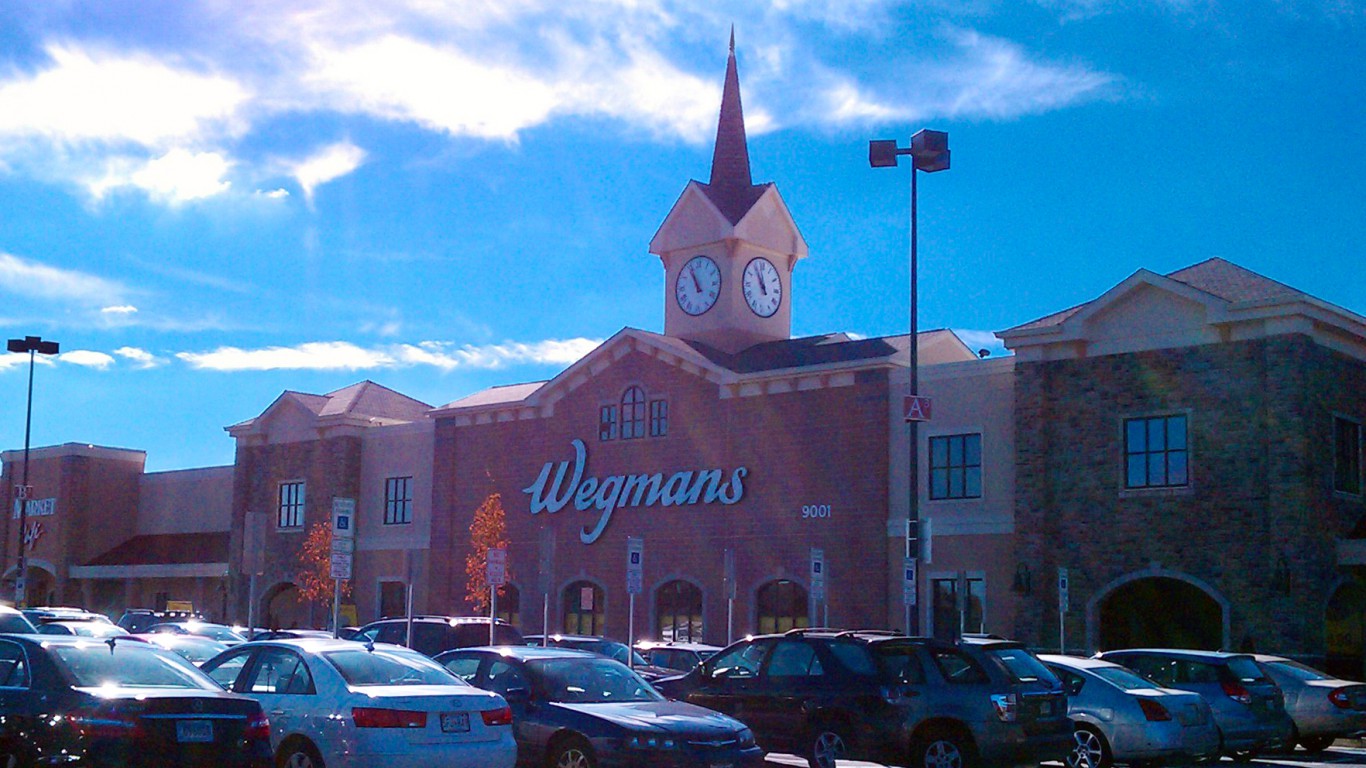
2. Wegmans
> 2018 reputation quotient: 82.75
> 2017 reputation quotient: 85.41
> Industry: Grocery store
> CEO: Colleen Wegman
Wegmans has the best reputation of any major grocery store chain and the second best of any company. The company, which has 96 locations in northeastern and mid-Atlantic states and employs some 48,000 people, reported $8.7 billion in revenue in 2017.
Wegman’s is held in high regard by both its employees and its customers. According to the company, more than 7,300 people contacted Wegmans in 2017 to ask if the company could open a store in their neighborhood. Wegmans also provides $4.5 million in scholarships and tuition assistance to its employees annually and makes substantial charitable donations. To reduce suffering from hunger, the Rochester, New York based grocery store chain donated 14.5 million pounds of food to food banks last year alone. As is the case with a handful of the other companies with the best reputations, Wegmans is family owned.
[in-text-ad-2]

1. Amazon.com
> 2018 reputation quotient: 83.22
> 2017 reputation quotient: 86.27
> Industry: Specialty retail
> CEO: Jeff Bezos
Amazon is perhaps the most disruptive company in recent memory — and also the most reputable. Created and headed by entrepreneur Jeff Bezos, Amazon has made its founder the wealthiest man in the world. While most Americans are familiar with the company as an e-commerce site, the company has also branched out into media streaming, product manufacturing, and cloud services.
The company’s reputation is bolstered not only by its products and services, but also by its financial performance. In the last five years, the company’s share price spiked from $269 to over $1,500. Amazon’s revenue growth is equally remarkable, climbing from $107.0 billion in 2015 to $177.9 billion in 2017.
Companies With the Worst Reputations
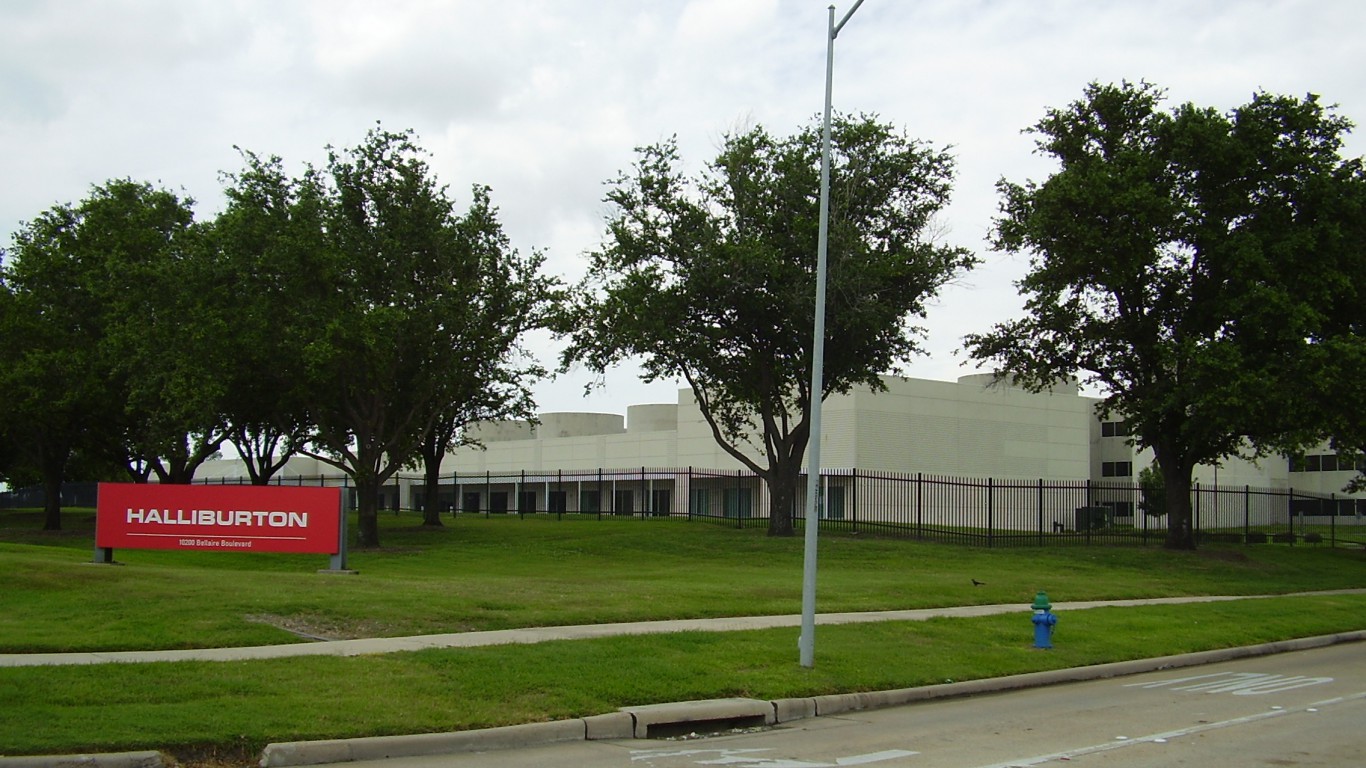
10. Halliburton
> 2018 reputation quotient: 61.96
> 2017 reputation quotient: 58.30
> Industry: Oil and gas equipment and services
> CEO: Jeffrey Miller
According to the Harris Poll, companies that are perceived as having a toxic culture, to be operating against society, or that have been marred by scandal are all likely to have poor reputations. Oil extraction services company Halliburton is one such company.
One likely reason for Halliburton’s poor reputation is that many consider it a war profiteer — especially since the Iraq War started in 2003. Halliburton has been awarded with some $39.5 billion in federal contracts as a result of the conflict. Further, many believe the company benefited from favoritism in Washington, especially as its former CEO, Dick Cheney, served as vice president. The company also had a role, along with BP, in the Deepwater Horizon explosion, which left 11 people dead and caused one of the worst oil spills in history.
[in-text-ad]

9. Goldman Sachs
> 2018 reputation quotient: 61.44
> 2017 reputation quotient: 56.32
> Industry: Financial services
> CEO: Lloyd Blankfein
Financial institutions regularly rank among the companies with the worst reputations. Though its reputation improved more than nearly every other company over the last year, Goldman Sachs remains among the least reputable. Goldman Sachs was one of the many financial institutions whose shady lending and investment practices lead to the subprime financial crisis and the Great Recession. It has also been used as a political punching bag in recent years — a symbol of the cozy relationship between Washington and Wall Street.
Goldman’s financial performance has also suffered in recent years. After three years of failing to grow revenue, the company finally reported an uptick in revenue in 2017. Still, the company’s 2017 revenue of $32.1 billion remains below its $34.5 billion revenue in 2014.
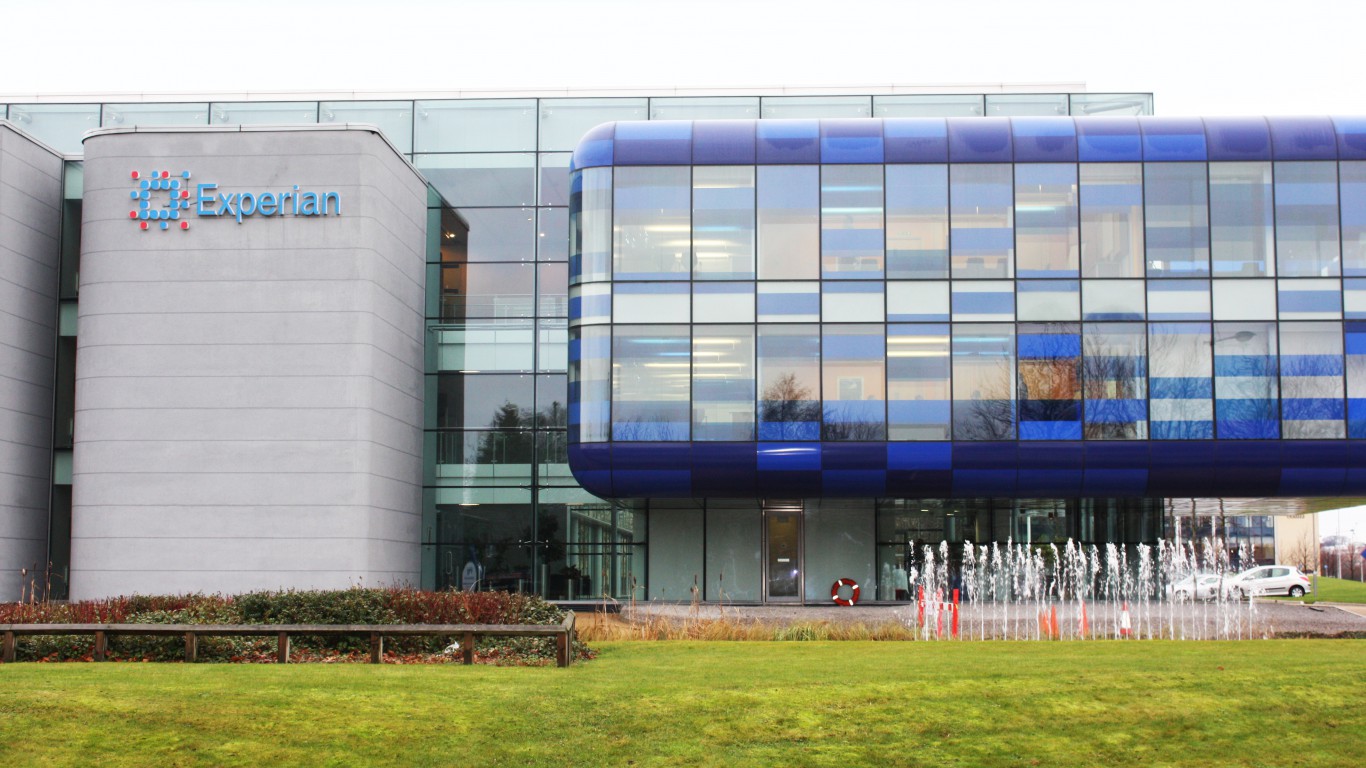
8. Experian
> 2018 reputation quotient: 60.66
> 2017 reputation quotient: N/A
> Industry: Credit risk assessment
> CEO: Brian Cassin
Backlash from the Equifax data breach in 2017 extended broadly across the credit reporting industry. Though Experian was unaffected by the Equifax hack, its reputation took a hit following the Equifax breach as the industry as a whole drew widespread scrutiny. Like Equifax, Experian provides personal data, account summaries of loans or lines of credit, public records, and history of credit checks. And just because Experian was not hacked does not mean it is any more secure. Experian relies on much the same security procedures and software that Equifax did when it was hacked.
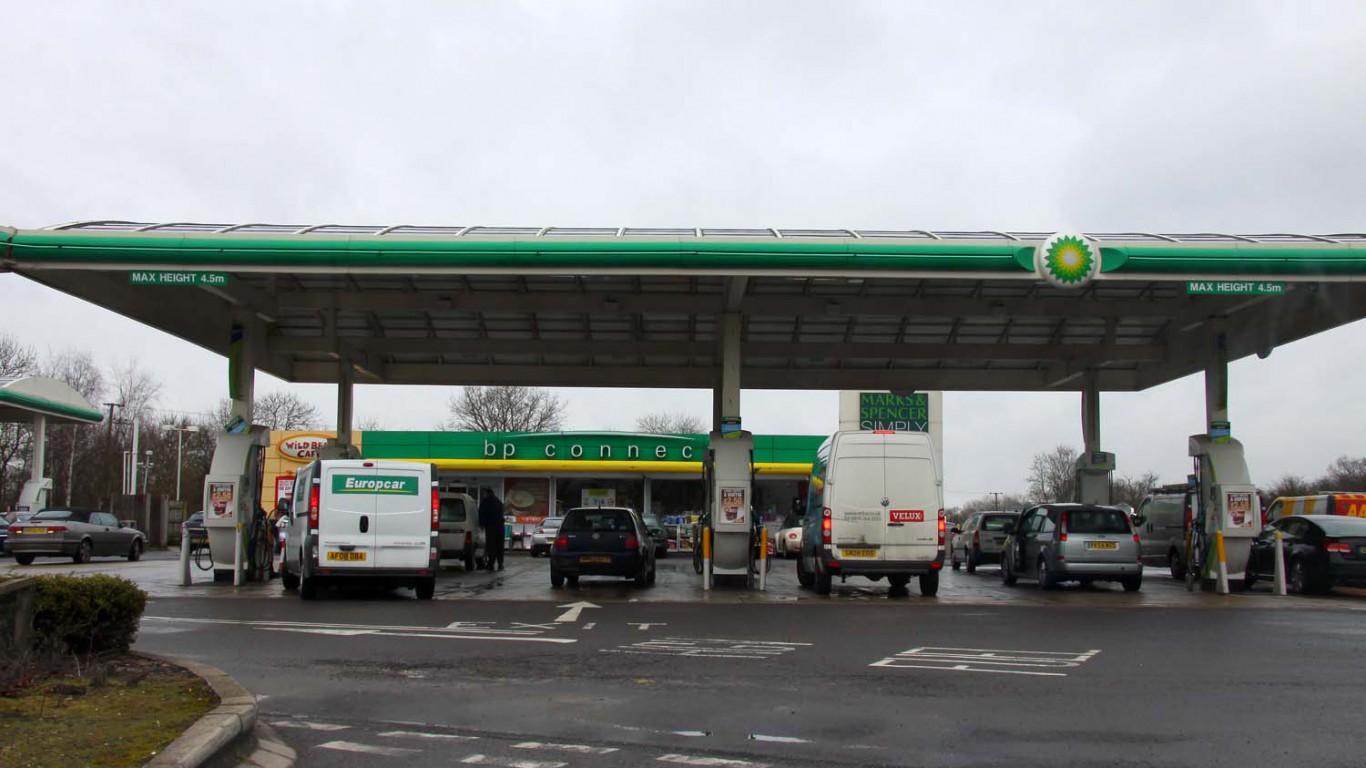
7. BP
> 2018 reputation quotient: 60.05
> 2017 reputation quotient: 63.99
> Industry: Oil and gas
> CEO: Robert Dudley
Along with Halliburton, BP is one of two energy companies to rank among those with the worst reputations. Also like Halliburton, BP’s poor reputation stems largely from an incident that occured years ago — namely, the 2010 Deepwater Horizon rig explosion, which left 11 people dead and resulted in the largest oil spill in U.S. history.
Problems for the company have persisted in other areas. Due in part to the broader slump in the oil industry, the company has reported a precipitous revenue decline. After three years of declining revenue, BP reported an increase in revenue in 2017. Still, BP’s 2017 revenue of $288.8 billion is well below the company’s 2014 revenue of $351.2 billion. The company also has disappointed shareholders, greatly underperforming compared to industry competitors over the last decade.
[in-text-ad-2]

6. Monsanto
> 2018 reputation quotient: 59.71
> 2017 reputation quotient: 56.61
> Industry: Agriculture
> CEO: Hugh Grant
Fairly or not, for many, Monsanto is the prototypical greedy, evil corporation. Because it has patents on genetically modified organism, or GMO, seeds, the company is often the target of the outspoken anti-GMO movement. However, the company’s public relations problems stretch back decades, long before GMOs, as Monsanto is also behind such poisons as Agent Orange, Dioxin, and carcinogenic PCPs.
Monsanto’s poor reputation among investors is likely the result of lackluster financial performance. The company reported $14.6 billion in revenue in 2017, down considerably from the $15.0 billion in 2015.
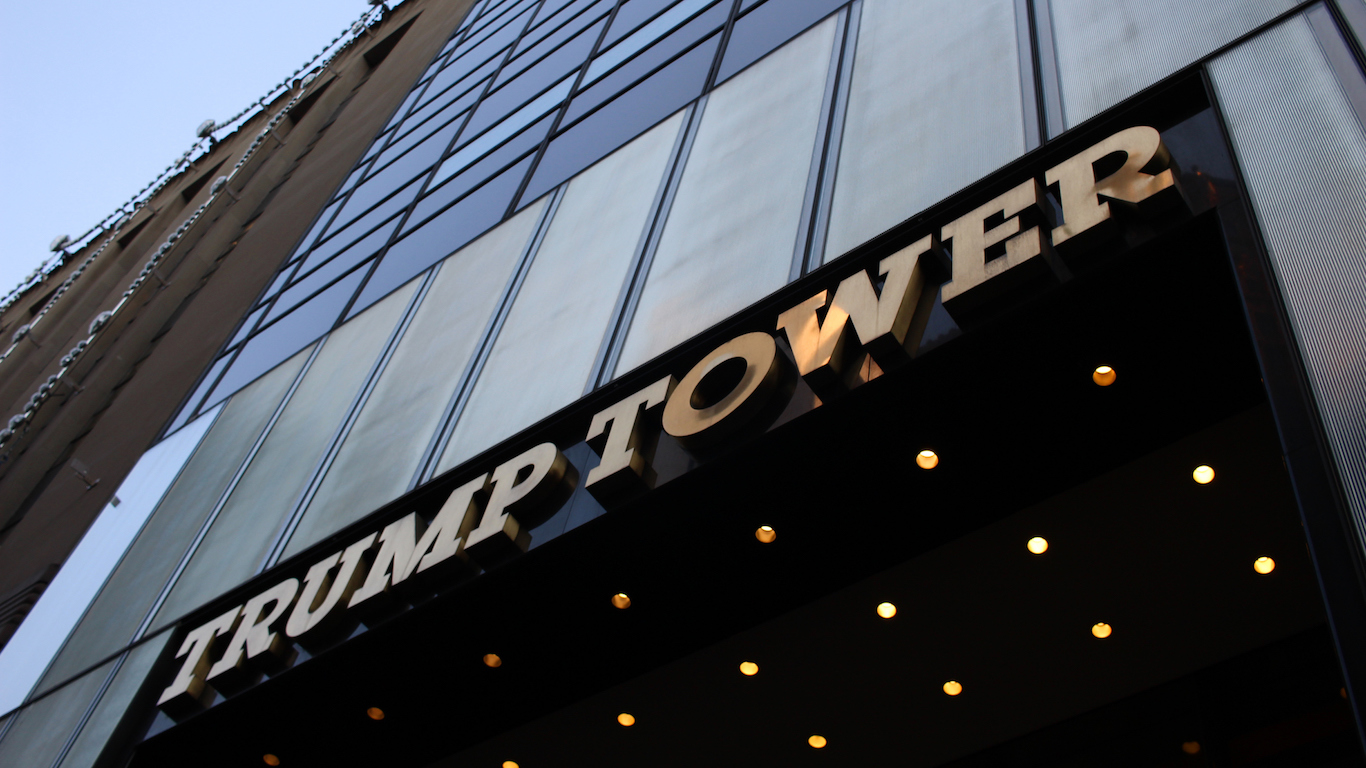
5. The Trump Organization
> 2018 reputation quotient: 57.94
> 2017 reputation quotient: N/A
> Industry: Real estate
> CEO: Donald Trump Jr.
President Donald Trump is considered the one of the least popular presidents at this point in his tenure in American history — and the reputation of the company bearing his name also suffered recently. A real estate company, The Trump Organization operates a winery, a number of luxury hotels, and international golf courses. Once headed by Trump, the organization is now run by his son, Donald Trump Jr.
In addition to the those who dislike the company for political reasons, The Trump Organization’s reputation is also likely suffering as many suspect that there could be a conflict of interest between the president’s family running the business and his duties as a public servant.
[in-text-ad]
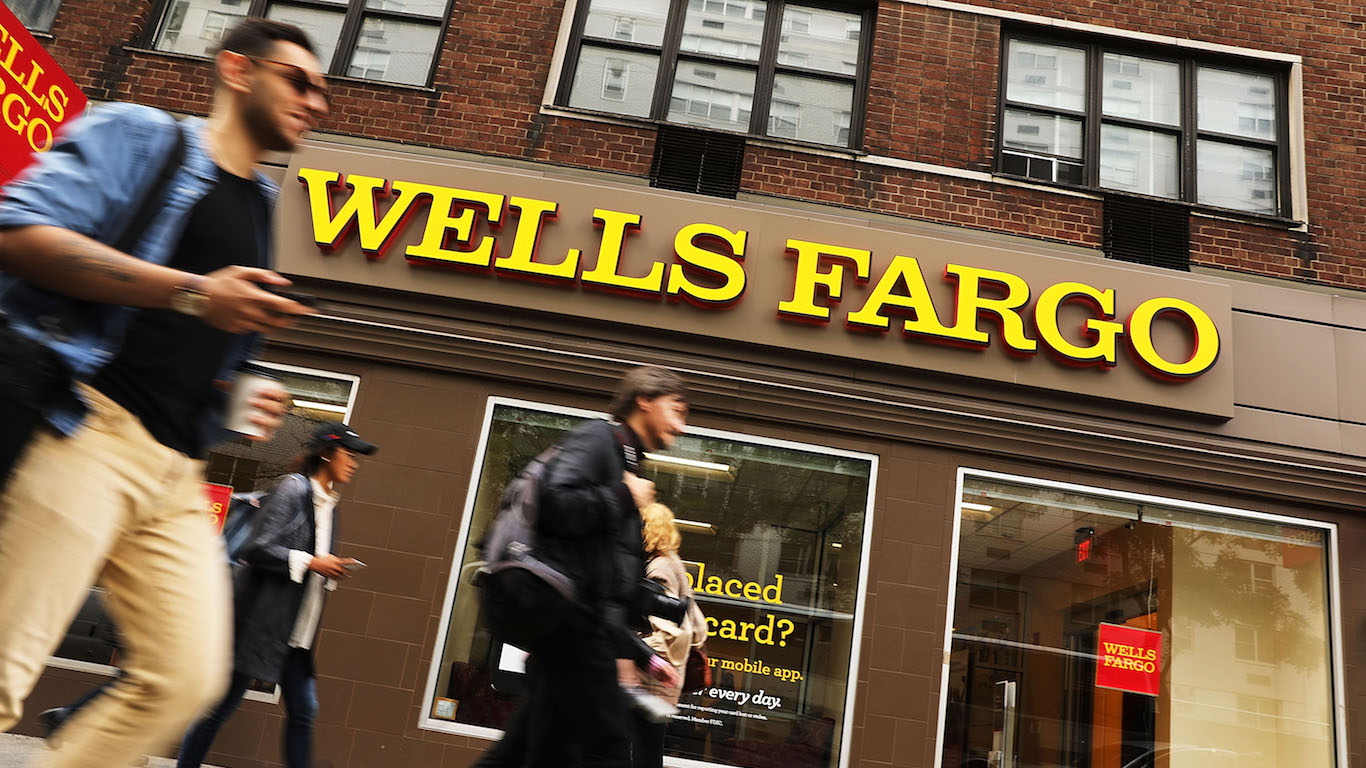
4. Wells Fargo & Company
> 2018 reputation quotient: 57.78
> 2017 reputation quotient: 49.11
> Industry: Financial services
> CEO: Timothy Sloan
Scandals are perhaps most harmful to a company’s reputation, and Wells Fargo is still reeling from one of the worst scandals in finance in recent memory. In 2016, regulators revealed the bank had created millions of fake credit and debit accounts without customers’ knowledge or consent. The revelation resulted in a $185 million fine and the resignation of then CEO John Stumpf. The company found itself in hot water once again last year for modifying mortgages without customers’ knowledge and charging over half a million customers for auto insurance they did not need.
As the fallout continues, earlier this year the Federal Reserve Bank decreed that the bank would not be allowed to grow its assets until it fixes its culture and internal problems. As a result, Wells Fargo areed to overhaul its board of directors.
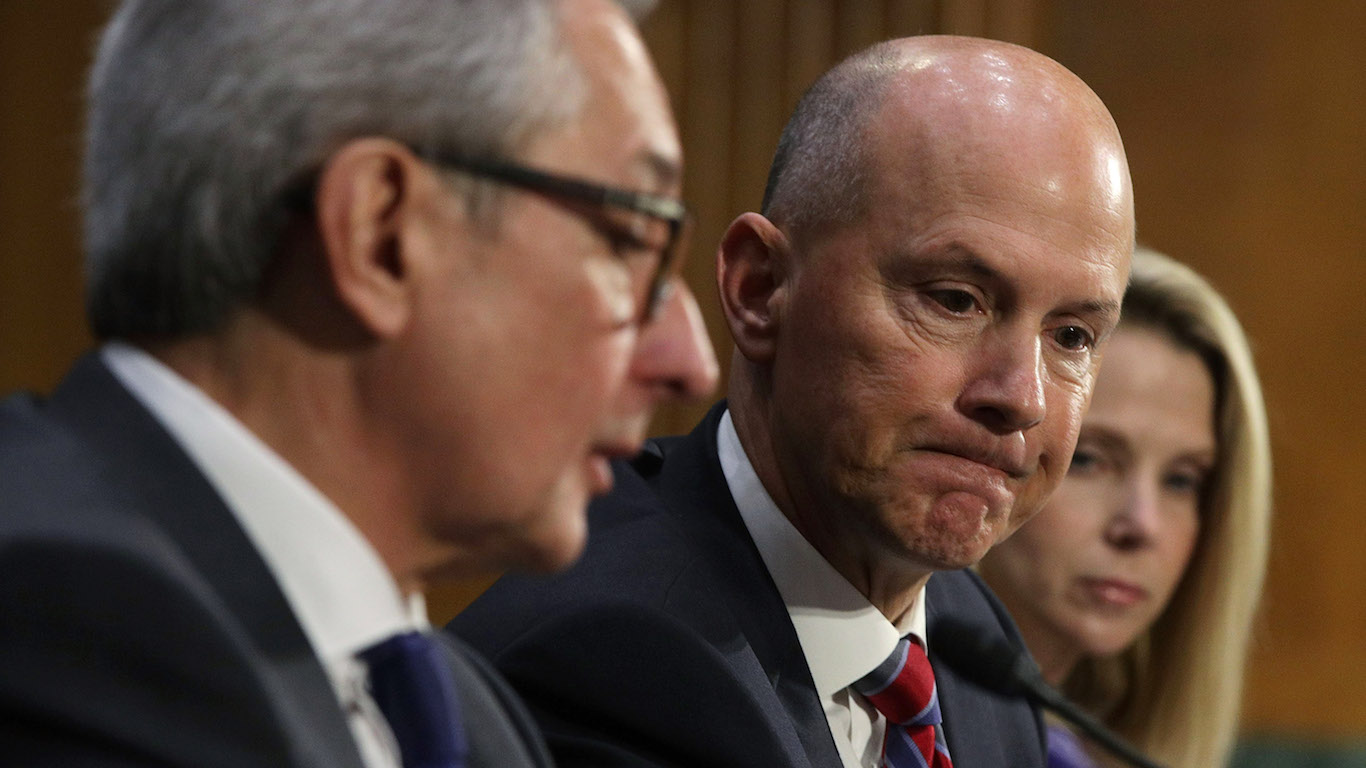
3. Equifax
> 2018 reputation quotient: 55.56
> 2017 reputation quotient: N/A
> Industry: Credit risk assessment
> CEO: Paulino do Rego Barros Jr.
Credit reporting company Equifax was the target of one of the largest data breaches in history. Between mid-May and late July 2017, Equifax’s databases were hacked, exposing the personal information, including addresses and social security numbers, of nearly 148 million Americans.
While Americans were rightfully outraged that their personal information was not adequately secure, the way the company handled the breach drew further ire. Rather than reporting the breach immediately as it was known, Equifax waited over a month to announce the hack. In a move many perceived as insufficient, Equifax offered those affected by the breach one-year of free identity theft protection.
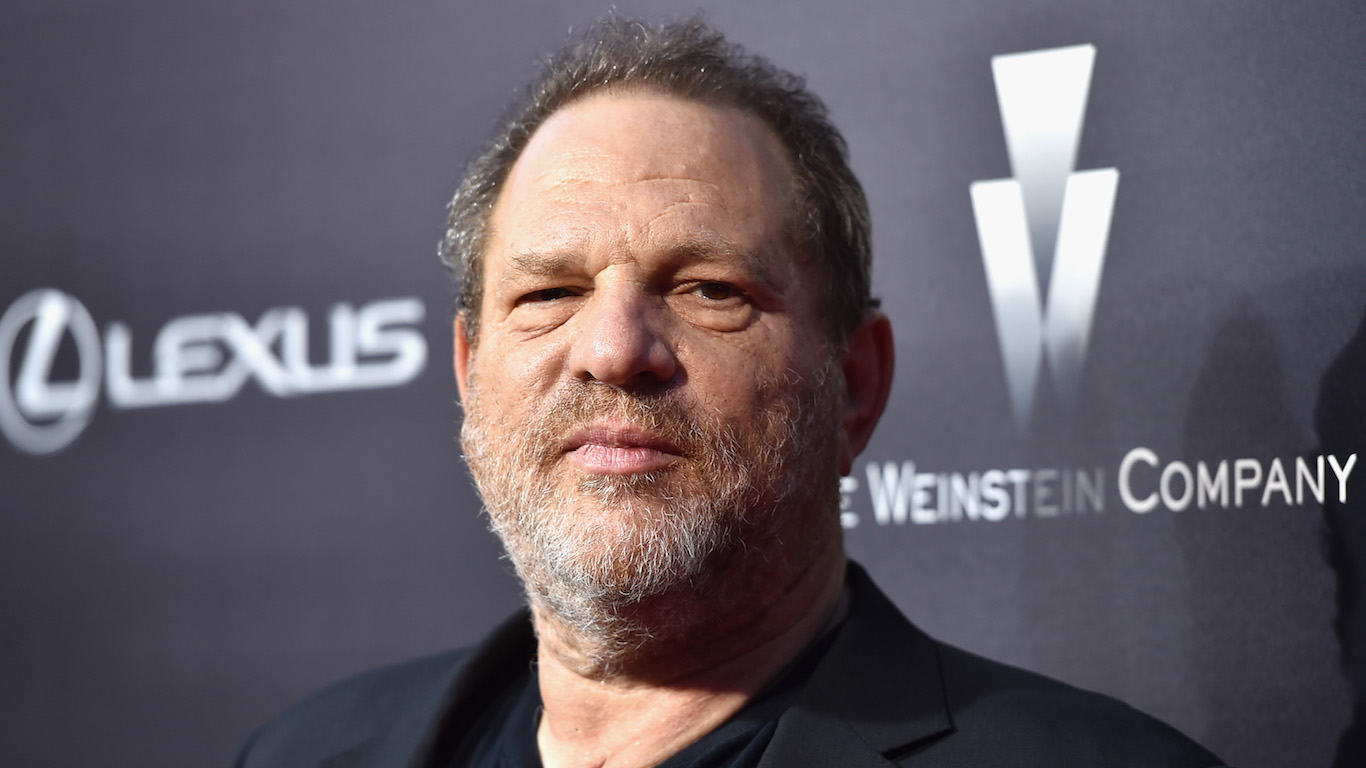
2. Weinstein Company
> 2018 reputation quotient: 52.48
> 2017 reputation quotient: N/A
> Industry: Film production
> CEO: Robert Weinstein
Rarely is a company’s reputation so badly damaged that it is no longer able to function. The Weinstein Company is one such rare example. Following an October 2017 story published in The New York Times detailing sexual harassment allegations spanning decades against movie mogul Harvey Weinstein, The Weinstein Company is now all but defunct.
Earlier this year, a deal for a third party to purchase the company fell through following revelations of previously unknown millions in debt the company holds. As it stands, The Weinstein Company will likely be forced to file for bankruptcy.
[in-text-ad-2]
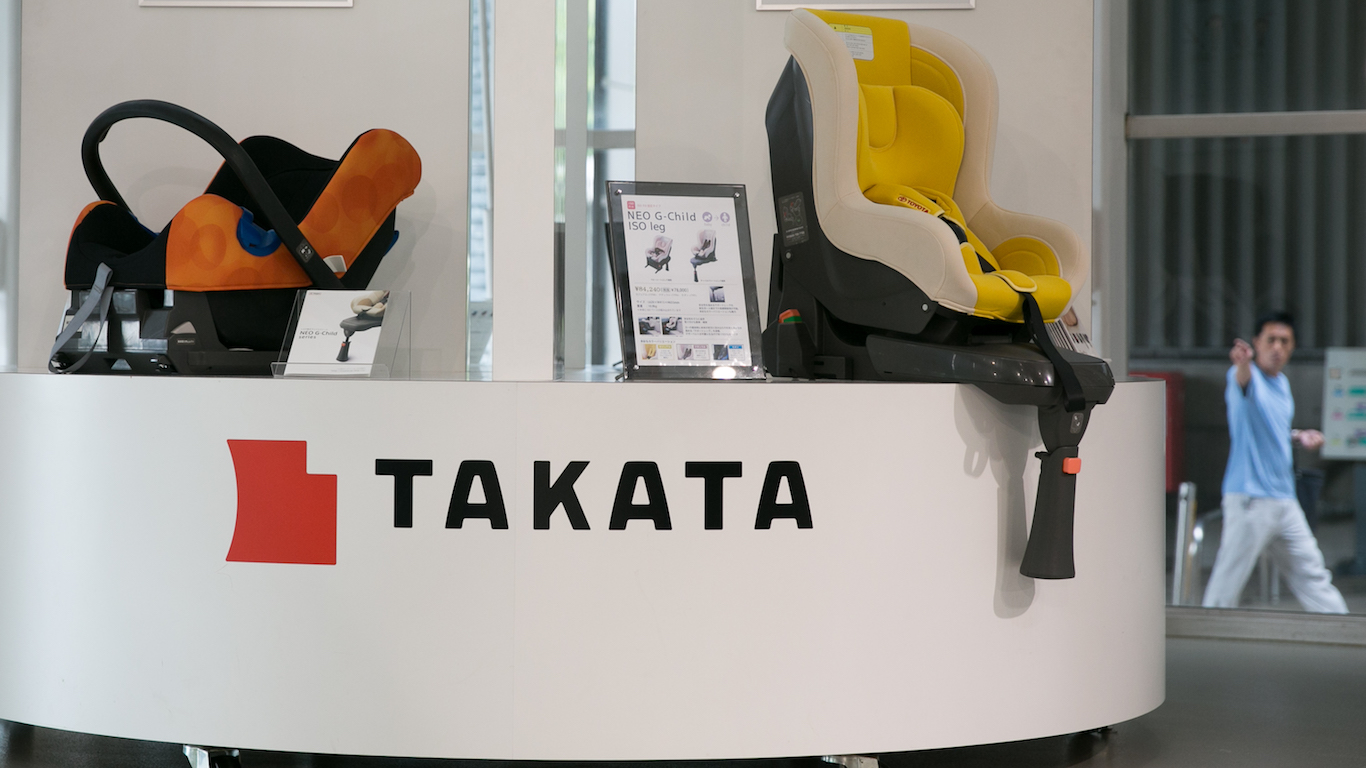
1. Takata
> 2018 reputation quotient: 45.17
> 2017 reputation quotient: 48.70
> Industry: Automotive
> CEO: N/A
Takata is a Japanese airbag manufacturer that is behind one of the biggest safety recalls in history. Takata airbags can explode with such force during an accident that they shoot dangerous shrapnel into drivers and passengers faces. The company’s airbags are installed in over 50 million Honda, Toyota, and Ford vehicles, and they have been linked to 22 known fatalities and over 180 injuries. The costly recall sent the company into bankruptcy. Chinese seatbelt manufacturer Key Safety Systems inked a deal to take over Takata’s remaining assets.
Detailed Findings
Grocery store and supermarket chains make up a large share of the most reputable companies this year. Of the 10 companies with the best reputations, four are grocery stores: Wegmans, HEB, Publix, and Aldi. Kroger, another grocery store chain, ranks among the top 20 companies in 2018.
While high ranking grocers on this list generally have happy employees and are active in philanthropic causes, they also partially owe their strong reputations to their industry. According to Harris Poll, grocery stores appeal to the American public because of their close connection to the community and the natural comfort they provide as purveyors of food.
The quality of a company’s products or services also has a considerable impact on its public reputation. For several companies on this list, a reputation for quality coupled with a clear set of values have garnered a loyal customer base. Fast food restaurant Chick-fil-A with its Christian values and clothing company Patagonia with its commitment to environmental protection are two such companies.
Among the companies with the worst reputations, corporate scandal is a common culprit for their fall from public grace. High-profile scandals, including sexual misconduct at the Weinstein Company, account fraud at Wells Fargo, and potential conflicts of interest in The Trump Organization are largely the reasons why these companies rank among those with the worst reputations.
A scandal for one company can have an impact on an entire industry. This year, Equifax ranks among the companies with the worst reputations after a data breach at the company exposed the personal information of nearly 150 million Americans.
Though distinct from Equifax, Experian is in the same business and also provides personal data, account summaries of loans or lines of credit, public records, and history of credit checks. Experian relies on much the same security procedures and software that Equifax does, and largely as a result, it also ranks among the companies with the worst reputation for the first time.
Methodology
To determine America’s most and least reputable companies, 24/7 Wall St. reviewed reputation scores of the nation’s 100 most recognizable companies from the 2018 Harris Poll Reputation Quotient (RQ), produced by market research firm Harris Insights and Analytics. The study consists of two parts: a nominations stage in which consumers identify the nation’s most visible companies, followed by a ratings stage, in which each company’s reputation is measured on a scale of 0-100. Additional company information came from SEC filings and other publicly available documents.
Choosing the right (or wrong) time to claim Social Security can dramatically change your retirement. So, before making one of the biggest decisions of your financial life, it’s a smart idea to get an extra set of eyes on your complete financial situation.
A financial advisor can help you decide the right Social Security option for you and your family. Finding a qualified financial advisor doesn’t have to be hard. SmartAsset’s free tool matches you with up to three financial advisors who serve your area, and you can interview your advisor matches at no cost to decide which one is right for you.
Click here to match with up to 3 financial pros who would be excited to help you optimize your Social Security outcomes.
Have questions about retirement or personal finance? Email us at [email protected]!
By emailing your questions to 24/7 Wall St., you agree to have them published anonymously on a673b.bigscoots-temp.com.
By submitting your story, you understand and agree that we may use your story, or versions of it, in all media and platforms, including via third parties.
Thank you for reading! Have some feedback for us?
Contact the 24/7 Wall St. editorial team.